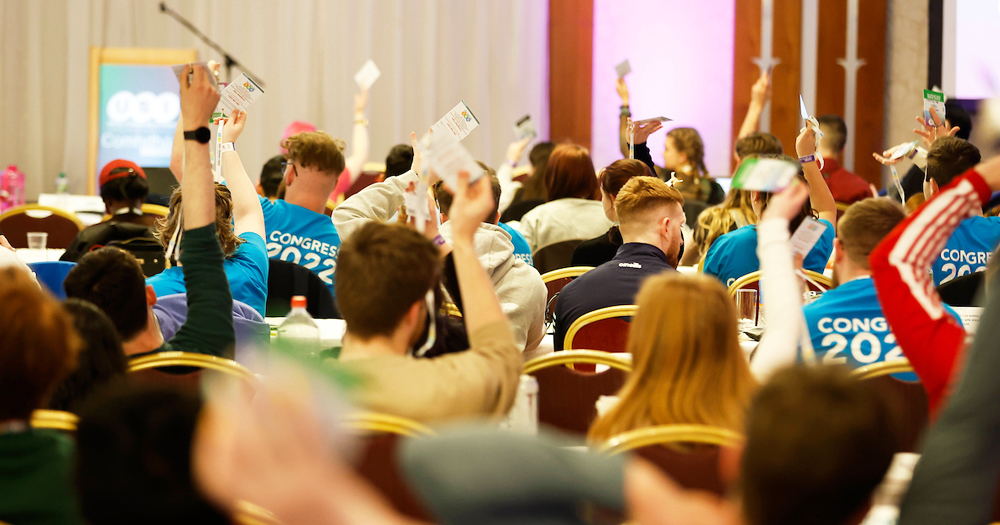By László Molnárfi.
The TCDSU is demanding rather than asking; 6 student unions have co-signed an open letter denouncing the government; the USI is calling for a walkout. As this year’s elected student representatives take power, it seems that we are entering a phase of renewed student radicalism. However, it is important to remember what led us trapped in the clutches of moderate, apolitical and weak leadership. Reflecting on his experiences in the student movement in the TCDSU, László Molnárfi wrote this piece a couple of months ago, on the structural factors that lead to the co-optation of student unions.
The alienation of our union’s main decision-making body from the grassroots is by design, not by accident. While much lip-service has been paid to inclusivity, it is not in the institutional interest of our representative body to engage the masses of students. Against the suffocating politics of hack culture, bureaucracy and officialdom, those who profess traditional syndicalism and a return to the radical student movement are crushed beneath the social power of a union which is under attack from neoliberal ideology.
At the heart, the student union starts doing the bidding of senior management. Slowly but surely, assembly bodies like Council are becoming the invisible occupation of the student body by the administration. Ultimately, this process hints at the capitalist takeover of student unions. No longer making change with the students on the streets, but for the students by afternoon tea with the Provost, a mass basis is neither necessary nor sought after for the union.
This is because the advent of neoliberal capitalism in the 1970s has led to the institutionalisation of student unions. Through exploiting institutional tendencies towards self-preservation, the ideology of making society subservient to the interests of capital has the ability to co-opt organisations. Spurred on by the profit motive, students start to identify as consumers and student unions view themselves as consumer representative bodies rather than radical and mass organisations which seek to change the world.
As this happens, leaders soon learn the corporate language and the way of making change in meeting rooms. Quality assurance to get “value for money” as an important criteria, being built into grievance procedures and being able to assist students in official structures are ways to dampen radical inclinations and work with the system. Mimicking the labour market, unions also take up mile-wide and inch-deep methods of engagement, and count student engagement in service numbers rather than in mobilising capacity. The obsession with distributing Freshers’ Bags, for one, is a striking example. Equally the onset of the union acting as a loudspeaker for its institution and serving to prop up the “student experience” comes from the introduction of league tables – an essentially commodifying system – in which neither party benefits from publicly bashing the other.
Since both the institution and the union face similar pressure under straining finances, they seek to cooperate. So, for example, as the institution cuts welfare services, the union steps in to take up the slack, which is then advertised by senior management. During this, social links are developed between the two. The union becomes a service provider with good working relationships with institutional leaders and therefore less likely to espouse oppositional politics, and more likely to keep ordinary students at an arm’s-length.
So, our unions are shifting towards an alienating model – that of service provision, and the delivering of inner-institutional change professionally for the students, but not anything beyond that with the students through a mass movement. Due to this, there arises a dissonance within the union’s proposed objectives. The union aims to effect power in such a way that students’ wishes are met. This involves, for example, campaigning for public education, which as history shows, can be achieved only through the power of the collective striking at the heart of neoliberalism. However, the union seeks to achieve it by cooperating with those who have diametrically opposed interests to the students. It is creating spaces where talking about something means not bringing them into existence, in essence anti-capitalist action that is now submerged in capitalism. Rather than having affinity with real political organising, their actions end up looking pretend-y – it is a simulacra of what would be the real thing, but neutered. In other words, the values of our campaign demands are in direct opposition to the means by which the demands are made. For example, student unions in Ireland are promoting the StudentSurvey.ie university ranking tool, which is a pro-corporate tool and seeks to categorise the student experience in KPI-centric terms, its equivalent in the U.K being boycotted by the the more radical NUS, while the same unions profess to be against commercialization, thus resulting in value dissonance.
All this seeks to further confirm the consumer identity of students rather than challenging it. Lacking a mass basis, the union is structurally condemned to the politics of liberal compromise. In 2020, students from U.K. universities went on a series of rent strikes, winning rebates of up to 30%. Curiously, it was not student unions leading the charge. They were espousing timid rhetoric to soften. Grassroots groups led the actions, in line with a curious phenomenon that is becoming global. As a result of the cosy and markedly non-adversarial relationship of student unions with their institutions, small, decentralised and grassroots student groups are being created to challenge their hegemony as the sole representative bodies of third-level students. You know it when you see it. Groups like “Demilitarise UCL”, “Transform LSE”, “Liberate the University” and others whose very name screams to whoever wills listen that another world is possible.
Students clearly feel out of touch with their student unions. The student voice has become domesticated, no longer challenging the fundamental sociopolitical order of the world, but has resigned itself to managing and softening its excesses the best it can. They have simply stopped challenging authorities in any discernible way, not because their commitment to ideas of social justice are wrong, but because of their broader ideological direction. If you want proof, look no further than our own union.
Sure, the union provides services, but when Joe Hill said in 1913 that there is power in a union, he didn’t mean the power to distribute raffles. He meant the ability of a representative body to collectively bargain for its members. Protesting the closure of the treasured Science Gallery, we mustered a mere 30 students, our election turnout is at 11% and if we are being honest, there has not been any shift of power towards students away from institutional leaders despite our appeasement. The politics of cooperation over confrontation is a choice, albeit made under duress of lacking engagement, by the union. It is difficult to challenge such an ideological choice, or any really, once your representative body has already legitimised it, not through referendum but by its whole institutional weight.
Case in point is what our union did around in-person exams. Working hard and putting in tremendous effort, they asked for mitigation measures in committees, but when these were not given, our union did nothing. No Twitter storm, no petition and no protest. While the 5000-strong #noinpersonexams open letter was making national headlines, our union refused to support it. Wanting engagement but refusing to engage with the mass movement of students is not a smart tactic, and looks to be a Judas kiss to the everyday student. This is why the union has become the tiger with no teeth; the snake whose venom has been turned to water; the dog that barks but never bites. Public pressure, hurting the reputation and finances of the university are not viewed as methods of making change, despite this being the only way to force the hands of College, as their interests are diametrically opposed to ours. We want education, they want profit.
This does not raise alarm bells, as the student movement practises ostrich politics. There is no better example of this than USI Congress, which I recently attended as part of a 19-strong delegation. As surprising as this is, our union was one of the most radical there, espousing leftist values. We were shocked at how the organisation was run. The event felt like a mix between a support group, public speaking competition and a circle jerk, where bureaucracy but also social norms made sure that no broader ideological questions could be posed. The lack of a mass basis, democratic deficit and the increasing co-optation by the government are all perfectly valid issues of our national union, a classic example being how they are trying to work with the state on the new HEA Bill 2022 by making amendments in select committees, rather than opposing it on the ideological grounds that it will lead to a government takeover of academia, or indeed their timid plea of asking Minister Harris over tea to implement adequate mitigation measures at the time of the #noinpersonexams campaign. Yet, procedural motions sought to block such debates. Out of 30 questions when it came to officer reports, 29 were thanking members of the executive, and only one was an actual question. The message is clear. Do not upset the apple cart. If you do, there will be personal and professional consequences, as demonstrated by the utter toxicity that delegates with a critical eye were met with at recent National Councils.
This year has seen our local union make progress on this front of open debate and accountability structures strengthened, which are good developments, but Council is not the most welcoming place either. We have seen the toxicity towards oppositional voices appear in the newspapers before, but simply having brought friends to meetings, I have to be honest and say that they did not feel comfortable. Everyone who actually cares about the union knows each other. There are inside jokes. The Twitter hashtag #yupcouncil is the biggest turn-off. In short, there are ways to do things, stemming from exclusionary norms the union prescribes.
Beneath the inaccessible culture is a much more serious issue, however. Inviting the masses of students into this club, making it much more representative, would mean that well-established networks of power are disturbed. Since there is abysmal engagement, the union inadvertently functions as a resumé mill, presenting itself as a stepping stone for those who want to further their careers. This is, in fact, according to the union’s website, one of the reasons to run for class representative. Extrinsic values, e.g. it looks good on the resumé, have replaced intrinsic values, e.g. fight the collective struggle, a process that researchers have also recognized in trade unions, as they are transformed to serve the labour market. It does not look good to a potential employer to be egging the Provost’s house, so there is a sort of institutional pull towards transferable skills, which are acquired through working within the bureaucratized bodies of College.
This is why the union has become so professionalised. The cow mask protest that our union did recently is a prime example of planned press management rather than real affinity with radical political action. It is the simulacra of what would be, but a neutered version thereof. Rather than taking direct action against the proposed 2.3% fee increases, our union negotiated in the backrooms, but did not really cause a fuss elsewhere. Building actual resistance to the commodification of education requires deep-engagement with the student body and direct action that looks ugly one one’s resumé. We must stop the loose train that is the institutionalised student union in its tracks before it speeds us all into the abyss of neoliberalism. It is time to throw the politics of liberal compromise into the dustbin of history. Instead, I call for a political, radical and militant union which through its very actions imagines the possibility of another world. Leave the meeting rooms, and flood the streets, and recognize before it is too late that the union’s culture carries within it the seeds of its own decay.



